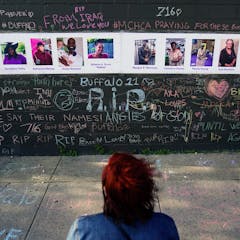
Articles on Nazism
Displaying 1 - 20 of 56 articles

Hundreds of thousands of people in Germany are taking to the streets to push back against the far-right, nationalist policies of the AfD, which currently holds 11% of the seats in parliament.

The German population was transformed under Nazism into a “bystander society” – even before the conditions of wartime normalised acts of excessive violence.

In his essays, Walter Benjamin sought to understand the nature of modernity. He drew on Marxism but was not contained by it, ranging across literature, art, popular culture, even Jewish mysticism.

The Holocaust is not just a memory in Israel. It’s part of how Israelis understand themselves and their country − and it’s playing a part in how the country responds to the Hamas massacres of Oct. 7.

Nazi war criminal Adolf Eichmann was anything but banal. His case is an apt reminder of how evil agents can deflect accountability, denying victims even the thin consolation of the moral high ground.

Finding the stories of individual Jews who fought the Nazis publicly and at great peril helped a scholar see history differently: that Jews were not passive. Instead, they actively fought the Nazis.

German philosopher Martin Heidegger was one of the 20th century’s most feted thinkers. A new book examining his Nazism in light of the now-available evidence, is a troubling, timely read.

The memorialisation of the Holocaust was key to the ideas and practice of the popular Australian Jewish antifascist left in the 1940s and 1950s.

Gan Siyabonga is unique in Israel. It highlights a group that was both anti-apartheid and pro-Zionist.

Spain has long avoided addressing the fact that tens of thousands of Spaniards were victims of Nazis, who collaborated with Spain’s former dictator, Francisco Franco.

In much of eastern Europe historical memory of communist rule has been brought into sharp focus by the war in Ukraine.

Oversimplified versions of the past lead to bad political decisions.

The far-right today shares more than just ideas with white supremacists of yesterday – they also share some pagan-inspired symbols.

The Russian embassy in Vilnius now sits on Ukrainian Heroes’ Street (Ukrainos Didvyrių g.), a direct response to the war.

The best of the past week’s coverage of the war in Ukraine.

Ukraine war: Vladimir Putin is struggling to convince people why history is on his side – both internationally and at home.

The US faces many of the same problems Germans faced after World War II: how to reject, punish and delegitimize the enemies of democracy. There are lessons in how Germany handled that challenge.

Donald Trump said followers of conspiracy theory ‘are very much against pedophilia.’ What he didn’t mention was the demonic imagery and language that peppers QAnon posts.

The culture of remembrance in Germany is viewed by many as exemplary. But it has some grave shortcomings.

On Holocaust Remembrance Day, or ‘Yom HaShoah,’ a music scholar recollects how composer Istvan Anhalt’s experiences in Nazi-occupied Hungary informed his later life and music in Canada.





